Tracts and Treatises of John Calvin (8 vols.)
Digital Logos Edition
Overview
The 8-volume Tracts and Treatises of John Calvin collection helps modern readers understand Calvin’s role in shaping the Reformation and his lasting influence as the key thinker of Reformed theology. These 28 treatises—written by Calvin, his contemporaries, his supporters, and his detractors—expose and illuminate the emergence of Reformed theology as a legitimate movement during the sixteenth century. They contain important debates on idolatry and images in worship, the sacraments, predestination, God’s sovereignty, and dozens of other topics. This collection also includes Calvin’s preface to the 1550 Geneva Bible.
The Tracts and Treatises of John Calvin also contains the 3-volume Tracts of the Reformation, first published in English by the Calvin Translation Society. This series includes the biography of Calvin written by Theodore Beza—an influential Reformer in his own right.
What’s more, the Logos edition of the John Calvin Sermons and Letters Collection contains extensive tagging and linking. All Scripture references display the verse on mouseover, and each reference is linked to the original language texts and English Bible translations in your library. With Logos, you can also perform advanced searches—searching Calvin’s tracts and treatises by passage or topic. That makes the Logos edition of the Tracts and Treatises of John Calvin ideal for historians, theologians, and Calvin scholars.
This title is included in the following collections
You can save when you purchase this product as part of a collection.
 The Essential Works of John Ca...$349.99$349.99
The Essential Works of John Ca...$349.99$349.99Calvin 500 Collection (108 vol...
$599.99$599.99Logos 6 Reformed Gold Legacy L...
$849.99$849.99Logos 5 Reformed Gold Legacy L...
$849.99$849.99
- $1,499.99
- $1,499.99
- $1,499.99
- $1,499.99
- $1,499.99
- $2,999.99
- $2,999.99
- $2,999.99
- $2,999.99
- $2,999.99
- $2,999.99
- $4,749.99$3,562.49
- $4,749.99
- $4,749.99
- $4,749.99
- $4,749.99
- $11,399.99
- $11,399.99
- $23,999.99$17,999.99
- $21,749.99
- $24,999.99

Key Features
- Life of John Calvin, by Theodore Beza and translated by Henry Beveridge
- 12 treatises on the sacraments
- Calvin’s preface to the 1550 Geneva Bible
- Treatises on the Council of Trent
Praise for John Calvin
. . . Calvin’s theology interests us in its historical context as an outstanding record of Reformation theology that historically—and at times even legally—has served as a basis of proclamation in modern Protestant churches.
Calvin helped the Reformation change the entire focus of the Christian life. Calvin’s teaching, preaching, and catechizing fostered growth in the relationship between believers and God.
—Joel R. Beeke
Calvin’s theological heritage has proved fertile perhaps to a greater extent than any other Protestant writer. Richard Baxter, Jonathan Edwards, and Karl Barth, in their very different ways, bear witness to the pivotal role that Calvin’s ideas have played in shaping Protestant self-perceptions down the centuries. . . . It is impossible to understand modern Protestantism without coming to terms with Calvin’s legacy to the movement which he did so much to nourish and sustain.
—Alister E. McGrath
The fundamental issue for John Calvin—from the beginning of his life to the end—was the issue of the centrality and supremacy and majesty of the glory of God.
John Calvin is a man of distinguished reputation, one of the great figures of church history.
—Wulfert de Greef
It would hardly be too much to say that for the latter part of his lifetime and a century after his death John Calvin was the most influential man in the world, in the sense that his ideas were making more history than those of anyone else during that period. Calvin’s theology produced the Puritans in England, the Huguenots in France, the ‘Beggars’ in Holland, the Covenanters in Scotland, and the Pilgrim Fathers of New England, and was more or less directly responsible for the Scottish uprising, the revolt of the Netherlands, the French wars of religion, and the English Civil War. Also, it was Calvin’s doctrine of the state as a servant of God that established the ideal of constitutional representative government and led to the explicit acknowledgment of the rights and liberties of subjects. . . . It is doubtful whether any other theologian has ever played so significant a part in world history.
[Calvin] easily takes the lead among the systematic expounders of the Reformed system of Christian doctrine. . . Calvin’s theology is based upon a thorough knowledge of the Scriptures. He was the ablest exegete among the Reformers, and his commentaries rank among the very best of ancient and modern times. His theology, therefore, is biblical rather than scholastic, and has all the freshness of enthusiastic devotion to the truths of God’s Word. At the same time he was a consummate logician and dialectician. He had a rare power of clear, strong, convincing statement. He built up a body of doctrines which is called after him, and which obtained symbolical authority through some of the leading Reformed Confessions of Faith.
What is it about Calvin that so inspires me? This: his disciplined style, his determination never to speculate, his utter submission to Bible words as God's words, his submission to Christ's Lordship, his sense of the holy, his concern to be as practical as possible; the fact that godly living was his aim and not theology for the sake of it. In a forest of theologians, Calvin stands like a Californian Redwood, towering over everyone else.
—Derek Thomas
A little bit of the world’s history was enacted in Geneva.
—Ludwig Häusser
The greatest exegete and theologian of the Reformation was undoubtedly Calvin. . . . He is one of the greatest interpreters of Scripture who ever lived. He owes that position to a combination of merits. He had a vigorous intellect, a dauntless spirit, a logical mind, a quick insight, a thorough knowledge of the human heart, quickened by rich and strange experience; above all, a manly and glowing sense of the grandeur of the Divine. The neatness, precision, and lucidity of his style, his classic training and wide knowledge, his methodical accuracy of procedure, his manly independence, his avoidance of needless and commonplace homiletics, his deep religious feeling, his careful attention to the entire scope and context of every passage, and the fact that he has commented on almost the whole of the Bible, make him tower above the great majority of those who have written on Holy Scripture.
—Frederic William Farrar
Product Details
- Title: Tracts and Treatises of John Calvin
- Author: John Calvin
- Volumes: 8
- Pages: 2,306
Individual Titles
- Tracts Relating to the Reformation, Vol. 1
- Tracts Relating to the Reformation, Vol. 2
- Tracts Relating to the Reformation, Vol. 3
- Calvin's Aphorisms and Letter to Francis the First: In Defense of the Reformation
- Christ, the End of the Law
- Calvin's Calvinism, Vol. 1: A Treatise on the Eternal Predestination of God
- Calvin's Calvinism, Vol. 2: A Defence of the Secret Providence of God
- Calvin: Theological Treatises
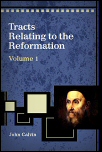
Tracts Relating to the Reformation, Vol. 1 contains the following tracts:
- Life of John Calvin, by Theodore Beza
- Letter by James Sadolet, a Roman Cardinal, to the Senate and People of Geneva
- Reply by John Calvin to Letter by Cardinal Sadolet to the Senate and People of Geneva
- Articles Agreed Upon by the Faculty of Sacred Theology of Paris
- The Necessity of Reforming the Church
- A Paternal Admonition by the Roman Pontiff, Paul III, to the Most Invincible Emperor, Charles V
- Remarks on the Letter of Pope Paul III
- An Admonition, Showing the Advantages which Christendom Might Derive from an Inventory of Relics
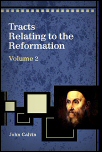
Tracts Relating to the Reformation, Vol. 2 contains the following tracts:
- Catechism of the Church of Geneva
- Forms of Prayer
- Form of Administering the Sacraments
- Visitation of the Sick
- Brief Confession of Faith
- Confession of Faith of the Reformed Churches of France
- Short Treatise on the Lord’s Supper
- Mutual Consent as to the Sacraments
- Second Defense of the Sacraments
- Last Admonition to Joachim Westphal
- True Partaking of the Flesh and Blood of Christ
- Best Method of Concord on the Sacraments
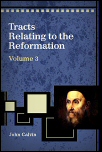
Tracts Relating to the Reformation, Vol. 3 contains the following tracts:
- Canons and Decrees of the Council of Trent, with the Antidote
- Adultero-German Interim, with Calvin’s Refutation
- The True Method of Reforming the Church and Healing Her Divisions
- The Sinfulness of Outward Conformity to Romish Rites
- Psychopannychia; Or the Soul’s Imaginary Sleep between Death and Judgment
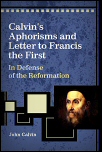
This concise volume was translated anonymously by a student at Oxford University during the nineteenth century. It contains aphorisms and short sayings from Calvin’s writings, and serves as a concise reference book to the key elements of Calvin’s thought. This volume also contains a new translation of Calvin’s letter to the king of France.
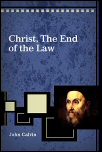
Christ, the End of the Law
- Author: John Calvin
- Translator: Thomas Weedon
- Publisher: William Cegg
- Publication Date: 1801
- Pages: 56
Christ, the End of the Law first appeared in 1550 as the preface to the Geneva Bible. It was translated into English in 1801, and provides an important source of material for understanding Calvin’s conception of the relationship between the law and grace. The trajectory of Scripture, Calvin shows, is toward redemption, and this story culminates in Christ.
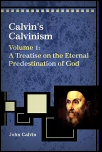
Calvin's Calvinism, Vol. 1: A Treatise on the Eternal Predestination of God
- Author: John Calvin
- Translator: Henry Cole
- Publisher: Wertheim and Macintosh
- Publication Date: 1856
- Pages: 192
For generations, the terms “Calvinist” and “Calvinism” has been used to bolster arguments and blame opponents. The translator of this volume, Henry Cole, laments the ways Calvin’s theology has been used by those who misunderstand him or, even worse, don’t read him. Cole writes that there are “almost as many different shades, phases, kinds, and degrees of Calvinism as there are Calvinists.” Cole translated Calvin’s treatise on predestination in order to encourage Calvinists to read and explore one of Calvinism’s most important doctrines.
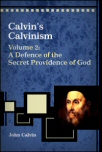
Calvin's Calvinism, Vol. 2: A Defence of the Secret Providence of God
- Author: John Calvin
- Translator: Henry Cole
- Publisher: Wertheim and Macintosh
- Publication Date: 1857
- Pages: 148
This volume contains Calvin’s treatise on the providence of God—a central component of Calvinism—first published in Geneva in 1558 and translated into English in 1857. In volume 2 of Calvin’s Calvinism, the translator intends to clarify confusion about this aspect of the doctrine of God by allowing Calvin to speak in his own words in this fresh translation.
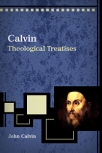
Calvin: Theological Treatises
- Author: J. K. S. Reid
- Publisher: Westminster John Knox
- Publication Date: 1954
- Pages: 356
Calvin: Theological Treatises contains sixteen important treatises, confessions, summaries of doctrine, and other writings. Published as part of the Library of Christian Classics, this volume makes the most important documents relevant to Calvin and the study of Calvinism available and accessible to a wide audience. Calvin: Theological Treatises also includes a detailed bibliography and subject index.
About John Calvin
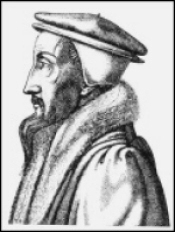
John Calvin was a theologian, pastor, biblical exegete, and tireless apologist for Reformed Christianity, and ranks among the most important thinkers in church history. His theological works, biblical commentaries, tracts, treatises, sermons, and letters helped establish the Reformation as a legitimate and thriving religious movement throughout Europe. No theologian has been as acclaimed or assailed as much as Calvin. Calvinism has spawned movements and sparked controversy throughout the centuries. Wars have been fought both to defend and destroy it, and its later proponents began political and theological revolutions in Western Europe and America. The breadth and depth of the engagement with his works since they first appeared four centuries ago—and their continuous publication since then—testifies to Calvin’s importance and lasting value for the church today. Thinking Christians from the twenty-first century who ignore Calvin’s writings do so at their own peril.
John Calvin was born on July 10, 1509 in Noyan, in France. He began his work in the church at the age of twelve, intending—at the request of his father—to train for the priesthood. Calvin attended the Collège de la Marche in Paris, before studying law at the University of Orléans in 1526 and continuing his studies at the University of Bourges. In 1532, Calvin’s first published work appeared: a commentary on Seneca's De Clementia.
On year later, he befriended Nicolas Cop, the rector of the Collège Royal in Paris. This friendship resulted in trouble for Calvin when Cop was branded a heretic after calling for reform in the Catholic Church. Cop fled to Basel, and Calvin was forced from Paris. The controversy expanded when, on the evening of October 18, 1534, anonymous attacks against the Mass were posted on public buildings, fueling the violence in the city. Calvin left France for Basel in January. The controversy, and the trouble it caused Calvin, disciplined him in his writing project, and he began working on the first edition of The Institutes of the Christian Religion, which appeared in 1536.
In June, 1536, Calvin returned to Paris as the violence subsided, but was expelled again in August of 1536. He left for Strasbourg, but was forced to Geneva instead, where he stayed at the request of William Farel. He became a reader in the church in 1537. In late 1537, Calvin fled Geneva after a controversy surrounding the Eucharist. He traveled to Basel before accepting a position at the church in Strasbourg. There, Calvin continued working on both the second edition of the Institutes and his Commentary on Romans. At the urging of his friends, Calvin married Idelette de Bure. He returned to Geneva in 1541.
Upon his arrival to Geneva, Calvin began writing prolifically. He continued his revisions to the Institutes, preached weekly, taught the Bible during the week, and delivered lectures on theology. Calvin also continued work on his New Testament commentaries.
His return to Geneva was not without controversy, however. He faced opposition from the libertines, who, in 1552, compromised his authority and nearly succeeded in banishing him from Geneva a second time. His greatest threat, however, came from his theological antagonist, Servetus. The frequent letters between Calvin and Servetus contain elements of their tenuous relationship, which were exacerbated when Servetus visited Geneva against Calvin’s orders, publically denied the Trinity, and disgraced the church. He was condemned for heresy and executed.
By 1553, Calvin was praised for his work in uniting Geneva and securing the future of the Reformation. The church housed refugees from England—among them John Knox—who brought the Reformed faith to England. Calvin also sent more than 100 Reformed missionaries to France, and frequently corresponded with both political leaders and second generation Reformers throughout Europe. He also founded a school in Geneva, and Theodore Beza became its first rector. Calvin’s influence quickly expanded beyond the vicinity of Geneva.
During the 1550s, Calvin’s health began to decline, prompting him to undertake a final revision and expansion of The Institutes of the Christian Religion. It was published in 1559, and was immediately reprinted and translated throughout Europe. Calvin became ill in early 1564, and preached his last sermon on February 6 of that same year. His health worsened throughout the spring, and he died on May 27. Thousands flocked to view his body, forcing the council in Geneva to bury him in an unmarked grave.
Reviews
2 ratings

Maxim Farocanag
6/22/2024

Ron Christensen
12/11/2017